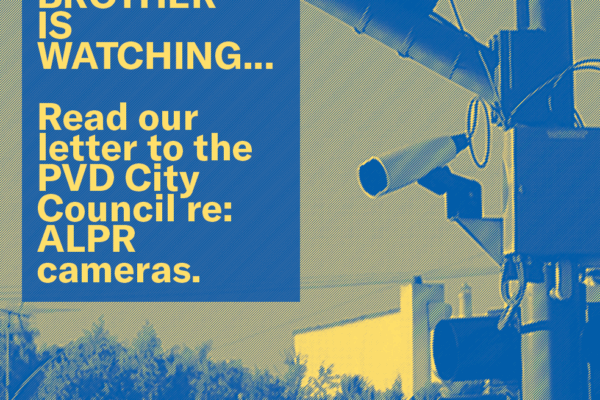After learning that the Providence Police Department is actively pursuing the installation of deceptively named automated license plate reader (ALPR) camera systems, operated by the private company Flock Safety, throughout the city, the ACLU of Rhode Island called on the Providence City Council to reject any such effort. In August of 2021, Cranston, Pawtucket and Woonsocket announced that they had unilaterally begun using this new surveillance technology in their communities.
The ACLU’s detailed four-page letter to the City Council offered numerous reasons to reject the surveillance devices:
- The cameras capture much more than license plate numbers. Police can input a wide variety of vehicle characteristics into the system – even including bumper stickers – to obtain information about a vehicle’s whereabouts, if captured by a camera, for the preceding 30 days. In addition, that search will encompass photos not only from Providence, but also from any of the other municipalities that are part of the system, allowing for statewide surveillance. Flock Safety’s website also advertises the ability to not only search by the aesthetic characteristics of a vehicle, but additionally by “audio evidence.”
- It is almost inevitable that the use of these cameras will expand over time to engage in more, and more intrusive, types of surveillance. The history of surveillance technology in this country – from wiretaps to stingrays to cameras to drones – has been a history of ever-growing uses, and those expanded uses are then used to justify and normalize even greater intrusions on privacy.
- Flock Safety’s cameras exemplify this “mission creep.” Just a few months ago, the company announced the availability of “advanced search” features for its camera systems that will, among other things, allow police to upload a picture of a vehicle from any source and then perform a search to see if any of the cameras have seen it, and also allow police to enter a license plate number, and then search cameras to find vehicles that frequently travel with that vehicle, to “help identify accomplices to crimes.”
- Separating the history of surveillance in the United States from racial discrimination is impossible because they are inextricably bound. Communities of color in particular have disproportionately experienced the egregious effects of expanded police surveillance, including of First Amendment activity, and this is not purely an historical lesson. In the last two years alone, for example, municipal law departments were found to have used surveillance camera footage to inappropriately monitor activists during the Black Lives Matter protests of summer 2020.
- Concerns about the normalization of increased surveillance are exemplified by the fact that some police departments have admitted that both they and Flock Safety have begun engaging in private outreach to business to develop a public-private network of these surveillance cameras. This outreach also undermines any notion that use of these cameras is intended to be, or will stay, a limited use system. Instead, it is clearly being considered in some quarters as a significant method of future widening of policing surveillance activities.
- In the absence of legislatively established limits on their use, the privacy rights of the public remain at the complete discretion of the police department and a private company, which can change their policies at any time. No matter what assurances of privacy are given in policy – by either a police department or Flock Safety – there are no meaningful constraints on their ability to change the rules at any time absent legislative safeguards.
The letter concludes by stating:
When police surveillance techniques like these ALPRs are promoted, they often imply a false choice between public safety and privacy. But public safety is the result of community-based tools and systems that directly and tangibly support residents – it is not, and has never been, a consequence of indiscriminate 24/7 surveillance. To suggest that such surveillance technology is only a threat to those committing crimes is dismissive of the legitimate privacy concerns that all residents have, and particularly ignores how police surveillance over the decades has often targeted communities in a racially discriminatory manner.
The ACLU asked the councilors to “reject the implementation of Flock Safety cameras in Providence and to further enact an ordinance that promotes community engagement, oversight, and extensive transparency for any future potential law enforcement surveillance technology.”


